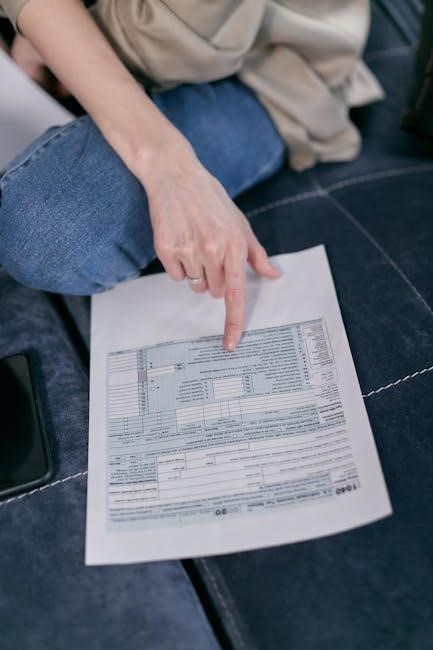
new york rental application form
A New York rental application is a critical document for both tenants and landlords, outlining personal and financial details to assess suitability for renting a property. It ensures a smooth evaluation process, helping landlords verify credibility while tenants demonstrate reliability. Understanding its requirements and legal aspects is essential for a successful rental experience in New York State.

What to Include in a New York Rental Application
A New York rental application typically includes personal information, proof of income, rental history, employment details, and pet information. Landlords use this data to assess tenant suitability and reliability.
Personal Information and Documents
A New York rental application requires detailed personal information to verify an applicant’s identity and assess their reliability as a tenant. Applicants must provide their full name, phone number, email address, and current residential address. Additionally, landlords often request proof of identification, such as a driver’s license, state ID, or passport. Some applications may also ask for a Social Security number to facilitate credit and background checks. Pet ownership details, including the type and number of pets, are typically included to assess potential property damage. Applicants may also need to list emergency contacts and provide proof of residency, such as a utility bill or lease agreement. These documents help landlords evaluate the applicant’s credibility and ensure compliance with legal rental requirements in New York State.
Proof of Income and Employment
Proof of income and employment is a critical component of a New York rental application, as it demonstrates an applicant’s ability to pay rent consistently. Landlords typically request recent pay stubs, W-2 forms, or a letter from an employer verifying job tenure and salary. Self-employed applicants may need to provide tax returns or bank statements showing consistent income. Some landlords may also accept proof of retirement income, disability benefits, or other reliable sources of funds. The documents should clearly indicate the applicant’s monthly income and stability of employment. This information helps landlords assess whether the applicant can meet the rental obligations. In some cases, landlords may require proof of employment through a verification process or contact with the employer. Ensuring all income documents are up-to-date and accurate is essential for a successful rental application in New York.

Legal Considerations
Legal considerations in New York rental applications ensure compliance with state laws, protecting both tenants and landlords. Key aspects include proper tenant screening, application fee limits, and required disclosures to maintain fairness and transparency.
New York Rental Application Laws
New York rental application laws are designed to protect both tenants and landlords, ensuring a fair and transparent process. Under New York Consolidated Laws, landlords must adhere to specific regulations when reviewing potential tenants. One key law is the limitation on application fees, which cannot exceed $20 or the cost of the background check, whichever is lower. Additionally, landlords are prohibited from charging excessive fees for credit checks or other screenings. Another important aspect is the requirement to provide written notice of any adverse action taken based on the application, such as denial due to credit history. Landlords must also disclose certain information, like the presence of lead paint in older buildings, to comply with state and federal regulations. These laws aim to prevent discrimination and ensure that all applicants are evaluated based on lawful criteria. Understanding these legal guidelines is crucial for both parties to navigate the rental process smoothly.
Application Fee Limits
In New York, rental application fees are strictly regulated to protect tenants from excessive charges. Under state law, landlords cannot charge more than $20 for processing a rental application or the actual cost of conducting a background or credit check, whichever is lower. This limit ensures that applicants are not unfairly burdened by high fees. Additionally, if a tenant provides a recent credit or background check (conducted within the past 30 days), the landlord must waive the application fee entirely. It is important for landlords to adhere to these limits, as violating them could result in legal consequences. Tenants should always verify that any fees charged align with New York’s legal guidelines to avoid potential scams or unfair practices. Understanding these rules helps both parties navigate the rental application process with clarity and fairness.

How to Fill Out the Application
Filling out a New York rental application requires careful attention to detail to ensure accuracy and completeness. Start by providing your personal information, including your full name, phone number, email, and current address. You may also be asked for proof of identification, such as a driver’s license or passport. Next, detail your employment history, including your job title, employer’s name, and contact information. Attach proof of income, such as recent pay stubs, W-2 forms, or a letter from your employer. You’ll also need to list your rental history, including previous landlords and their contact details. Some applications may request a co-signer, especially if your income is insufficient. Be prepared to disclose any pets or smoking habits, as these may affect your eligibility. Finally, review the application thoroughly to ensure all sections are complete and accurate before submission. Always keep a copy of the completed form for your records;

The Landlord Evaluation Process
Landlords evaluate potential tenants by verifying credit scores, employment history, rental references, and income stability. They may conduct background checks to assess reliability and ensure a tenant’s ability to meet lease obligations.

Credit and Background Checks
Credit and Background Checks
Credit and background checks are crucial steps in the New York rental application process. Landlords typically require a credit report to assess an applicant’s financial history and reliability. A minimum credit score of 600-650 is often expected, though this may vary. A higher score can improve chances of approval and may lead to better lease terms. Background checks are conducted to verify criminal history, eviction records, and other public records. These checks help landlords evaluate potential risks and ensure a tenant’s credibility. In New York, landlords must comply with legal guidelines when performing these checks. The process ensures fairness and transparency, protecting both parties. Tenants should be aware of their rights and the information being reviewed. By understanding the criteria, applicants can prepare accordingly and improve their likelihood of securing the rental property. This step is essential for landlords to make informed decisions about tenant suitability.

Reference and Income Verification
Reference and income verification are essential steps in the New York rental application process. Landlords typically request references from previous landlords or employers to assess an applicant’s reliability and rental history. These references provide insights into the tenant’s behavior, payment habits, and adherence to lease terms. Income verification is equally critical, as landlords need to confirm that applicants can afford the rent. Common documents include recent pay stubs, W-2 forms, bank statements, or letters from employers. Self-employed individuals may need to provide tax returns or financial statements. Landlords may also contact employers directly to verify employment status and salary details. This process ensures that tenants have a stable income and can meet their financial obligations. Accurate and honest information is crucial, as misrepresentation can lead to application denial. Tenants should prepare these documents in advance to streamline the process and improve their chances of approval.

Avoiding Rental Application Scams
Avoiding rental application scams is crucial for tenants in New York. Scammers often target hopeful renters by posing as landlords or property managers. Red flags include requests for bank account numbers, Social Security details, or payments before viewing the property. Legitimate landlords typically request standard information like proof of income and rental history. Be cautious of unsolicited contacts or ads that seem too good to be true. Verify the property owner’s identity through public records or by contacting the listed real estate agency. Never pay fees without signing a lease or ensuring the property is legitimate. Trust your instincts and avoid rushed processes. If asked to wire money or pay upfront without proper documentation, it’s likely a scam. Report suspicious activity to local authorities to protect yourself and others. Always prioritize secure, verified methods of communication and payment to safeguard your personal and financial information.

Best Practices for Tenants and Landlords
For tenants, it’s essential to thoroughly prepare all required documents, such as proof of income, employment verification, and rental history, to streamline the application process. Being transparent about financial status and rental intentions builds trust with landlords. Tenants should also carefully review the lease agreement before signing, ensuring all terms are clear and agreed upon. For landlords, best practices include conducting thorough background and credit checks to assess tenant reliability. Providing detailed, written explanations for application decisions fosters transparency and fairness. Both parties should maintain open communication throughout the rental process to address concerns promptly. Landlords should ensure compliance with New York rental laws, while tenants should understand their rights and responsibilities. A written tenancy agreement is crucial to outline expectations and avoid disputes. By following these practices, both tenants and landlords can create a mutually beneficial and respectful rental relationship. Open dialogue and preparedness are key to a smooth and successful process.